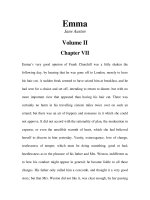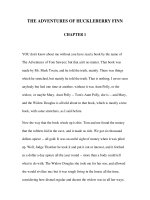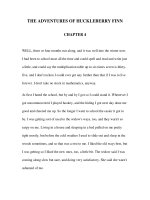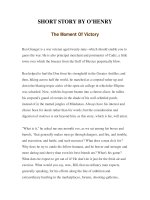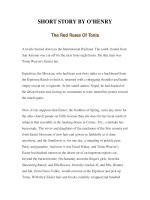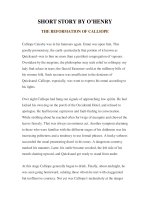LUYỆN ĐỌC TIẾNG ANH QUA TÁC PHẨM VĂN HỌC-VANITY FAIR -WILLIAM MAKERPEACE THACKERAY -CHAPTER 35 potx
Bạn đang xem bản rút gọn của tài liệu. Xem và tải ngay bản đầy đủ của tài liệu tại đây (41.52 KB, 16 trang )
VANITY FAIR
WILLIAM MAKERPEACE THACKERAY
CHAPTER 35
Widow and Mother
The news of the great fights of Quatre Bras and Waterloo reached England
at the same time. The Gazette first published the result of the two battles; at
which glorious intelligence all England thrilled with triumph and fear.
Particulars then followed; and after the announcement of the victories came
the list of the wounded and the slain. Who can tell the dread with which that
catalogue was opened and read! Fancy, at every village and homestead
almost through the three kingdoms, the great news coming of the battles in
Flanders, and the feelings of exultation and gratitude, bereavement and
sickening dismay, when the lists of the regimental losses were gone through,
and it became known whether the dear friend and relative had escaped or
fallen. Anybody who will take the trouble of looking back to a file of the
newspapers of the time, must, even now, feel at second-hand this breathless
pause of expectation. The lists of casualties are carried on from day to day:
you stop in the midst as in a story which is to be continued in our next.
Think what the feelings must have been as those papers followed each other
fresh from the press; and if such an interest could be felt in our country, and
about a battle where but twenty thousand of our people were engaged, think
of the condition of Europe for twenty years before, where people were
fighting, not by thousands, but by millions; each one of whom as he struck
his enemy wounded horribly some other innocent heart far away.
The news which that famous Gazette brought to the Osbornes gave a
dreadful shock to the family and its chief. The girls indulged unrestrained in
their grief. The gloom-stricken old father was still more borne down by his
fate and sorrow. He strove to think that a judgment was on the boy for his
disobedience. He dared not own that the severity of the sentence frightened
him, and that its fulfilment had come too soon upon his curses. Sometimes a
shuddering terror struck him, as if he had been the author of the doom which
he had called down on his son. There was a chance before of reconciliation.
The boy’s wife might have died; or he might have come back and said,
Father I have sinned. But there was no hope now. He stood on the other side
of the gulf impassable, haunting his parent with sad eyes. He remembered
them once before so in a fever, when every one thought the lad was dying,
and he lay on his bed speechless, and gazing with a dreadful gloom. Good
God! how the father clung to the doctor then, and with what a sickening
anxiety he followed him: what a weight of grief was off his mind when, after
the crisis of the fever, the lad recovered, and looked at his father once more
with eyes that recognised him. But now there was no help or cure, or chance
of reconcilement: above all, there were no humble words to soothe vanity
outraged and furious, or bring to its natural flow the poisoned, angry blood.
And it is hard to say which pang it was that tore the proud father’s heart
most keenly—that his son should have gone out of the reach of his
forgiveness, or that the apology which his own pride expected should have
escaped him.
Whatever his sensations might have been, however, the stem old man would
have no confidant. He never mentioned his son’s name to his daughters; but
ordered the elder to place all the females of the establishment in mourning;
and desired that the male servants should be similarly attired in deep black.
All parties and entertainments, of course, were to be put off. No
communications were made to his future son-in-law, whose marriage-day
had been fixed: but there was enough in Mr. Osborne’s appearance to
prevent Mr. Bullock from making any inquiries, or in any way pressing
forward that ceremony. He and the ladies whispered about it under their
voices in the drawing-room sometimes, whither the father never came. He
remained constantly in his own study; the whole front part of the house
being closed until some time after the completion of the general mourning.
About three weeks after the 18th of June, Mr. Osborne’s acquaintance, Sir
William Dobbin, called at Mr. Osborne’s house in Russell Square, with a
very pale and agitated face, and insisted upon seeing that gentleman.
Ushered into his room, and after a few words, which neither the speaker nor
the host understood, the former produced from an inclosure a letter sealed
with a large red seal. “My son, Major Dobbin,” the Alderman said, with
some hesitation, “despatched me a letter by an officer of the —th, who
arrived in town to-day. My son’s letter contains one for you, Osborne.” The
Alderman placed the letter on the table, and Osborne stared at him for a
moment or two in silence. His looks frightened the ambassador, who after
looking guiltily for a little time at the grief-stricken man, hurried away
without another word.
The letter was in George’s well-known bold handwriting. It was that one
which he had written before daybreak on the 16th of June, and just before he
took leave of Amelia. The great red seal was emblazoned with the sham coat
of arms which Osborne had assumed from the Peerage, with “Pax in bello”
for a motto; that of the ducal house with which the vain old man tried to
fancy himself connected. The hand that signed it would never hold pen or
sword more. The very seal that sealed it had been robbed from George’s
dead body as it lay on the field of battle. The father knew nothing of this, but
sat and looked at the letter in terrified vacancy. He almost fell when he went
to open it.
Have you ever had a difference with a dear friend? How his letters, written
in the period of love and confidence, sicken and rebuke you! What a dreary
mourning it is to dwell upon those vehement protests of dead affection!
What lying epitaphs they make over the corpse of love! What dark, cruel
comments upon Life and Vanities! Most of us have got or written drawers
full of them. They are closet-skeletons which we keep and shun. Osborne
trembled long before the letter from his dead son.
The poor boy’s letter did not say much. He had been too proud to
acknowledge the tenderness which his heart felt. He only said, that on the
eve of a great battle, he wished to bid his father farewell, and solemnly to
implore his good offices for the wife—it might be for the child—whom he
left behind him. He owned with contrition that his irregularities and his
extravagance had already wasted a large part of his mother’s little fortune.
He thanked his father for his former generous conduct; and he promised him
that if he fell on the field or survived it, he would act in a manner worthy of
the name of George Osborne.
His English habit, pride, awkwardness perhaps, had prevented him from
saying more. His father could not see the kiss George had placed on the
superscription of his letter. Mr. Osborne dropped it with the bitterest,
deadliest pang of balked affection and revenge. His son was still beloved and
unforgiven.
About two months afterwards, however, as the young ladies of the family
went to church with their father, they remarked how he took a different seat
from that which he usually occupied when he chose to attend divine
worship; and that from his cushion opposite, he looked up at the wall over
their heads. This caused the young women likewise to gaze in the direction
towards which their father’s gloomy eyes pointed: and they saw an elaborate
monument upon the wall, where Britannia was represented weeping over an
urn, and a broken sword and a couchant lion indicated that the piece of
sculpture had been erected in honour of a deceased warrior. The sculptors of
those days had stocks of such funereal emblems in hand; as you may see still
on the walls of St. Paul’s, which are covered with hundreds of these braggart
heathen allegories. There was a constant demand for them during the first
fifteen years of the present century.
Under the memorial in question were emblazoned the well-known and
pompous Osborne arms; and the inscription said, that the monument was
“Sacred to the memory of George Osborne, Junior, Esq., late a Captain in his
Majesty’s —th regiment of foot, who fell on the 18th of June, 1815, aged 28
years, while fighting for his king and country in the glorious victory of
Waterloo. Dulce et decorum est pro patria mori.”
The sight of that stone agitated the nerves of the sisters so much, that Miss
Maria was compelled to leave the church. The congregation made way
respectfully for those sobbing girls clothed in deep black, and pitied the stern
old father seated opposite the memorial of the dead soldier. “Will he forgive
Mrs. George?” the girls said to themselves as soon as their ebullition of grief
was over. Much conversation passed too among the acquaintances of the
Osborne family, who knew of the rupture between the son and father caused
by the former’s marriage, as to the chance of a reconciliation with the young
widow. There were bets among the gentlemen both about Russell Square
and in the City.
If the sisters had any anxiety regarding the possible recognition of Amelia as
a daughter of the family, it was increased presently, and towards the end of
the autumn, by their father’s announcement that he was going abroad. He
did not say whither, but they knew at once that his steps would be turned
towards Belgium, and were aware that George’s widow was still in Brussels.
They had pretty accurate news indeed of poor Amelia from Lady Dobbin
and her daughters. Our honest Captain had been promoted in consequence of
the death of the second Major of the regiment on the field; and the brave
O’Dowd, who had distinguished himself greatly here as upon all occasions
where he had a chance to show his coolness and valour, was a Colonel and
Companion of the Bath.
Very many of the brave —th, who had suffered severely upon both days of
action, were still at Brussels in the autumn, recovering of their wounds. The
city was a vast military hospital for months after the great battles; and as
men and officers began to rally from their hurts, the gardens and places of
public resort swarmed with maimed warriors, old and young, who, just
rescued out of death, fell to gambling, and gaiety, and love-making, as
people of Vanity Fair will do. Mr. Osborne found out some of the —th
easily. He knew their uniform quite well, and had been used to follow all the
promotions and exchanges in the regiment, and loved to talk about it and its
officers as if he had been one of the number. On the day after his arrival at
Brussels, and as he issued from his hotel, which faced the park, he saw a
soldier in the well-known facings, reposing on a stone bench in the garden,
and went and sate down trembling by the wounded convalescent man.
“Were you in Captain Osborne’s company?” he said, and added, after a
pause, “he was my son, sir.”
The man was not of the Captain’s company, but he lifted up his unwounded
arm and touched-his cap sadly and respectfully to the haggard broken-
spirited gentleman who questioned him. “The whole army didn’t contain a
finer or a better officer,” the soldier said. “The Sergeant of the Captain’s
company (Captain Raymond had it now), was in town, though, and was just
well of a shot in the shoulder. His honour might see him if he liked, who
could tell him anything he wanted to know about—about the —th’s actions.
But his honour had seen Major Dobbin, no doubt, the brave Captain’s great
friend; and Mrs. Osborne, who was here too, and had been very bad, he
heard everybody say. They say she was out of her mind like for six weeks or
more. But your honour knows all about that—and asking your pardon”—the
man added.
Osborne put a guinea into the soldier’s hand, and told him he should have
another if he would bring the Sergeant to the Hotel du Parc; a promise which
very soon brought the desired officer to Mr. Osborne’s presence. And the
first soldier went away; and after telling a comrade or two how Captain
Osborne’s father was arrived, and what a free-handed generous gentleman
he was, they went and made good cheer with drink and feasting, as long as
the guineas lasted which had come from the proud purse of the mourning old
father.
In the Sergeant’s company, who was also just convalescent, Osborne made
the journey of Waterloo and Quatre Bras, a journey which thousands of his
countrymen were then taking. He took the Sergeant with him in his carriage,
and went through both fields under his guidance. He saw the point of the
road where the regiment marched into action on the 16th, and the slope
down which they drove the French cavalry who were pressing on the
retreating Belgians. There was the spot where the noble Captain cut down
the French officer who was grappling with the young Ensign for the colours,
the Colour- Sergeants having been shot down. Along this road they retreated
on the next day, and here was the bank at which the regiment bivouacked
under the rain of the night of the seventeenth. Further on was the position
which they took and held during the day, forming time after time to receive
the charge of the enemy’s horsemen and lying down under the shelter of the
bank from the furious French cannonade. And it was at this declivity when
at evening the whole English line received the order to advance, as the
enemy fell back after his last charge, that the Captain, hurraying and rushing
down the hill waving his sword, received a shot and fell dead. “It was Major
Dobbin who took back the Captain’s body to Brussels,” the Sergeant said, in
a low voice, “and had him buried, as your honour knows.” The peasants and
relic-hunters about the place were screaming round the pair, as the soldier
told his story, offering for sale all sorts of mementoes of the fight, crosses,
and epaulets, and shattered cuirasses, and eagles.
Osborne gave a sumptuous reward to the Sergeant when he parted with him,
after having visited the scenes of his son’s last exploits. His burial-place he
had already seen. Indeed, he had driven thither immediately after his arrival
at Brussels. George’s body lay in the pretty burial-ground of Laeken, near
the city; in which place, having once visited it on a party of pleasure, he had
lightly expressed a wish to have his grave made. And there the young officer
was laid by his friend, in the unconsecrated corner of the garden, separated
by a little hedge from the temples and towers and plantations of flowers and
shrubs, under which the Roman Catholic dead repose. It seemed a
humiliation to old Osborne to think that his son, an English gentleman, a
captain in the famous British army, should not be found worthy to lie in
ground where mere foreigners were buried. Which of us is there can tell how
much vanity lurks in our warmest regard for others, and how selfish our love
is? Old Osborne did not speculate much upon the mingled nature of his
feelings, and how his instinct and selfishness were combating together. He
firmly believed that everything he did was right, that he ought on all
occasions to have his own way—and like the sting of a wasp or serpent his
hatred rushed out armed and poisonous against anything like opposition. He
was proud of his hatred as of everything else. Always to be right, always to
trample forward, and never to doubt, are not these the great qualities with
which dullness takes the lead in the world?
As after the drive to Waterloo, Mr. Osborne’s carriage was nearing the gates
of the city at sunset, they met another open barouche, in which were a
couple of ladies and a gentleman, and by the side of which an officer was
riding. Osborne gave a start back, and the Sergeant, seated with him, cast a
look of surprise at his neighbour, as he touched his cap to the officer, who
mechanically returned his salute. It was Amelia, with the lame young Ensign
by her side, and opposite to her her faithful friend Mrs. O’Dowd. It was
Amelia, but how changed from the fresh and comely girl Osborne knew. Her
face was white and thin. Her pretty brown hair was parted under a widow’s
cap—the poor child. Her eyes were fixed, and looking nowhere. They stared
blank in the face of Osborne, as the carriages crossed each other, but she did
not know him; nor did he recognise her, until looking up, he saw Dobbin
riding by her: and then he knew who it was. He hated her. He did not know
how much until he saw her there. When her carriage had passed on, he
turned and stared at the Sergeant, with a curse and defiance in his eye cast at
his companion, who could not help looking at him—as much as to say “How
dare you look at me? Damn you! I do hate her. It is she who has tumbled my
hopes and all my pride down.” “Tell the scoundrel to drive on quick,” he
shouted with an oath, to the lackey on the box. A minute afterwards, a horse
came clattering over the pavement behind Osborne’s carriage, and Dobbin
rode up. His thoughts had been elsewhere as the carriages passed each other,
and it was not until he had ridden some paces forward, that he remembered it
was Osborne who had just passed him. Then he turned to examine if the
sight of her father-in-law had made any impression on Amelia, but the poor
girl did not know who had passed. Then William, who daily used to
accompany her in his drives, taking out his watch, made some excuse about
an engagement which he suddenly recollected, and so rode off. She did not
remark that either: but sate looking before her, over the homely landscape
towards the woods in the distance, by which George marched away.
“Mr. Osborne, Mr. Osborne!” cried Dobbin, as he rode up and held out his
hand. Osborne made no motion to take it, but shouted out once more and
with another curse to his servant to drive on.
Dobbin laid his hand on the carriage side. “I will see you, sir,” he said. “I
have a message for you.”
“From that woman?” said Osborne, fiercely.
“No,” replied the other, “from your son”; at which Osborne fell back into the
corner of his carriage, and Dobbin allowing it to pass on, rode close behind
it, and so through the town until they reached Mr. Osborne’s hotel, and
without a word. There he followed Osborne up to his apartments. George
had often been in the rooms; they were the lodgings which the Crawleys had
occupied during their stay in Brussels.
“Pray, have you any commands for me, Captain Dobbin, or, I beg your
pardon, I should say MAJOR Dobbin, since better men than you are dead,
and you step into their SHOES?” said Mr. Osborne, in that sarcastic tone
which he sometimes was pleased to assume.
“Better men ARE dead,” Dobbin replied. “I want to speak to you about
one.”
“Make it short, sir,” said the other with an oath, scowling at his visitor.
“I am here as his closest friend,” the Major resumed, “and the executor of
his will. He made it before he went into action. Are you aware how small his
means are, and of the straitened circumstances of his widow?”
“I don’t know his widow, sir,” Osborne said. “Let her go back to her father.”
But the gentleman whom he addressed was determined to remain in good
temper, and went on without heeding the interruption.
“Do you know, sir, Mrs. Osborne’s condition? Her life and her reason
almost have been shaken by the blow which has fallen on her. It is very
doubtful whether she will rally. There is a chance left for her, however, and
it is about this I came to speak to you. She will be a mother soon. Will you
visit the parent’s offence upon the child’s head? or will you forgive the child
for poor George’s sake?”
Osborne broke out into a rhapsody of self-praise and imprecations;— by the
first, excusing himself to his own conscience for his conduct; by the second,
exaggerating the undutifulness of George. No father in all England could
have behaved more generously to a son, who had rebelled against him
wickedly. He had died without even so much as confessing he was wrong.
Let him take the consequences of his undutifulness and folly. As for himself,
Mr. Osborne, he was a man of his word. He had sworn never to speak to that
woman, or to recognize her as his son’s wife. “And that’s what you may tell
her,” he concluded with an oath; “and that’s what I will stick to to the last
day of my life.”
There was no hope from that quarter then. The widow must live on her
slender pittance, or on such aid as Jos could give her. “I might tell her, and
she would not heed it,” thought Dobbin, sadly: for the poor girl’s thoughts
were not here at all since her catastrophe, and, stupefied under the pressure
of her sorrow, good and evil were alike indifferent to her.
So, indeed, were even friendship and kindness. She received them both
uncomplainingly, and having accepted them, relapsed into her grief.
Suppose some twelve months after the above conversation took place to
have passed in the life of our poor Amelia. She has spent the first portion of
that time in a sorrow so profound and pitiable, that we who have been
watching and describing some of the emotions of that weak and tender heart,
must draw back in the presence of the cruel grief under which it is bleeding.
Tread silently round the hapless couch of the poor prostrate soul. Shut gently
the door of the dark chamber wherein she suffers, as those kind people did
who nursed her through the first months of her pain, and never left her until
heaven had sent her consolation. A day came—of almost terrified delight
and wonder—when the poor widowed girl pressed a child upon her breast—
a child, with the eyes of George who was gone—a little boy, as beautiful as
a cherub. What a miracle it was to hear its first cry! How she laughed and
wept over it—how love, and hope, and prayer woke again in her bosom as
the baby nestled there. She was safe. The doctors who attended her, and had
feared for her life or for her brain, had waited anxiously for this crisis before
they could pronounce that either was secure. It was worth the long months of
doubt and dread which the persons who had constantly been with her had
passed, to see her eyes once more beaming tenderly upon them.
Our friend Dobbin was one of them. It was he who brought her back to
England and to her mother’s house; when Mrs. O’Dowd, receiving a
peremptory summons from her Colonel, had been forced to quit her patient.
To see Dobbin holding the infant, and to hear Amelia’s laugh of triumph as
she watched him, would have done any man good who had a sense of
humour. William was the godfather of the child, and exerted his ingenuity in
the purchase of cups, spoons, pap- boats, and corals for this little Christian.
How his mother nursed him, and dressed him, and lived upon him; how she
drove away all nurses, and would scarce allow any hand but her own to
touch him; how she considered that the greatest favour she could confer
upon his godfather, Major Dobbin, was to allow the Major occasionally to
dandle him, need not be told here. This child was her being. Her existence
was a maternal caress. She enveloped the feeble and unconscious creature
with love and worship. It was her life which the baby drank in from her
bosom. Of nights, and when alone, she had stealthy and intense raptures of
motherly love, such as God’s marvellous care has awarded to the female
instinct— joys how far higher and lower than reason—blind beautiful
devotions which only women’s hearts know. It was William Dobbin’s task
to muse upon these movements of Amelia’s, and to watch her heart; and if
his love made him divine almost all the feelings which agitated it, alas! he
could see with a fatal perspicuity that there was no place there for him. And
so, gently, he bore his fate, knowing it, and content to bear it.
I suppose Amelia’s father and mother saw through the intentions of the
Major, and were not ill-disposed to encourage him; for Dobbin visited their
house daily, and stayed for hours with them, or with Amelia, or with the
honest landlord, Mr. Clapp, and his family. He brought, on one pretext or
another, presents to everybody, and almost every day; and went, with the
landlord’s little girl, who was rather a favourite with Amelia, by the name of
Major Sugarplums. It was this little child who commonly acted as mistress
of the ceremonies to introduce him to Mrs. Osborne. She laughed one day
when Major Sugarplums’ cab drove up to Fulham, and he descended from it,
bringing out a wooden horse, a drum, a trumpet, and other warlike toys, for
little Georgy, who was scarcely six months old, and for whom the articles in
question were entirely premature.
The child was asleep. “Hush,” said Amelia, annoyed, perhaps, at the
creaking of the Major’s boots; and she held out her hand; smiling because
William could not take it until he had rid himself of his cargo of toys. “Go
downstairs, little Mary,” said he presently to the child, “I want to speak to
Mrs. Osborne.” She looked up rather astonished, and laid down the infant on
its bed.
“I am come to say good-bye, Amelia,” said he, taking her slender little white
hand gently.
“Good-bye? and where are you going?” she said, with a smile.
“Send the letters to the agents,” he said; “they will forward them; for you
will write to me, won’t you? I shall be away a long time.”
“I’ll write to you about Georgy,” she said. “Dear’ William, how good you
have been to him and to me. Look at him. Isn’t he like an angel?”
The little pink hands of the child closed mechanically round the honest
soldier’s finger, and Amelia looked up in his face with bright maternal
pleasure. The cruellest looks could not have wounded him more than that
glance of hopeless kindness. He bent over the child and mother. He could
not speak for a moment. And it was only with all his strength that he could
force himself to say a God bless you. “God bless you,” said Amelia, and
held up her face and kissed him.
“Hush! Don’t wake Georgy!” she added, as William Dobbin went to the
door with heavy steps. She did not hear the noise of his cab-wheels as he
drove away: she was looking at the child, who was laughing in his sleep.




